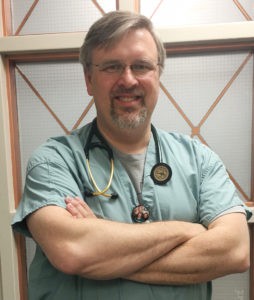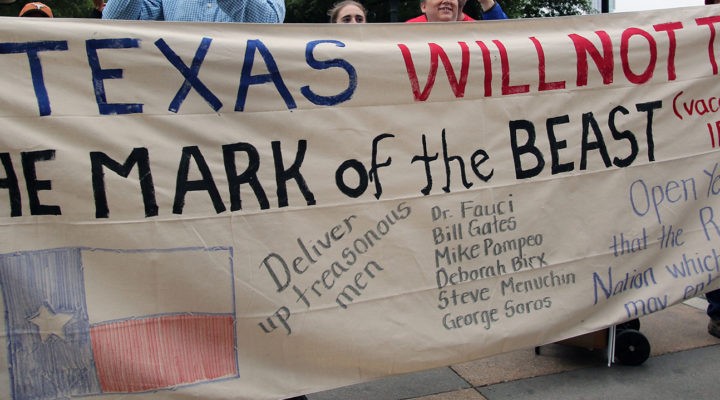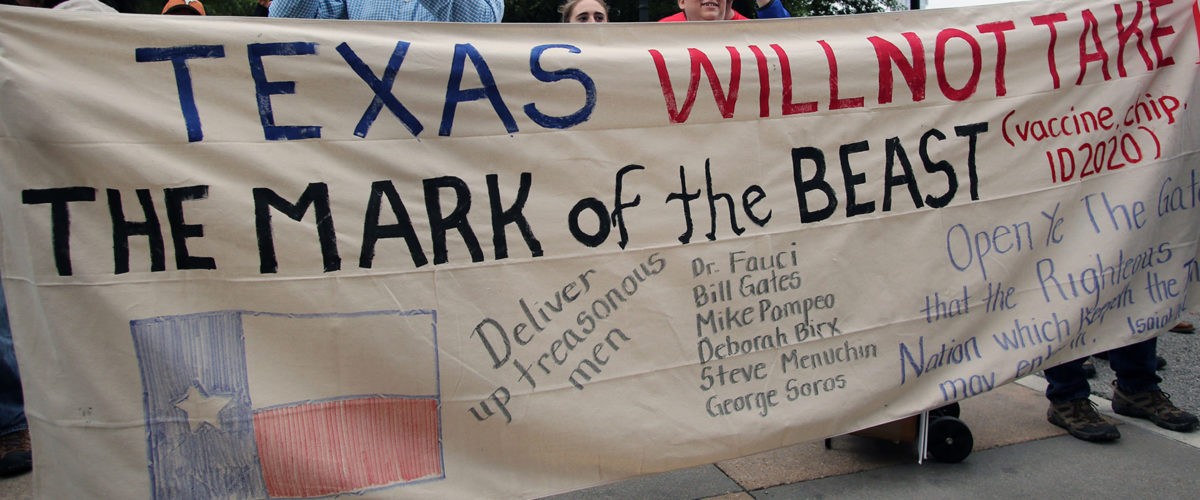A local church is experiencing an outbreak of COVID-19. This in and of itself is not rant-worthy; it’s sad, but it hardly sets them apart.
Except, as with most of the patients hospitalized nationwide with COVID, these patients are not vaccinated. That’s not a shock, either, as Alabama lags behind the nation in vaccination rates. But the word, from multiple sources within the congregation, is that this church was actively discouraging its members from being vaccinated.
 I had heard, third-hand, that the pastor of this congregation had compared vaccination to “the mark of the beast.” So I looked them up this weekend and ended up engaging the pastor briefly over Facebook. He denied the “mark of the beast” comment, and so I will have to take him at his word, but his response to the broader vaccine question was, “I believe it is up to the individual to decide whether they want the vaccine or not.” I then encouraged him to take a more active role in encouraging vaccination among his members. I even gave him my cell number if he wanted to talk person-to-person. In a surprise to no one, my phone has not rung.
I had heard, third-hand, that the pastor of this congregation had compared vaccination to “the mark of the beast.” So I looked them up this weekend and ended up engaging the pastor briefly over Facebook. He denied the “mark of the beast” comment, and so I will have to take him at his word, but his response to the broader vaccine question was, “I believe it is up to the individual to decide whether they want the vaccine or not.” I then encouraged him to take a more active role in encouraging vaccination among his members. I even gave him my cell number if he wanted to talk person-to-person. In a surprise to no one, my phone has not rung.
Yesterday, he posted a video acknowledging that “there is a lot of sickness,” but the closest he could come to an endorsement of vaccination was that Christians need to “exercise our authority over sickness.”
So, pastor, let me expound on your tepid statement.
I am a Christian. I was practically delivered in Ruhama Baptist Church. I have had the finest Bible teaching and preaching my whole life. I am a man of faith — not perfect but trying. And, I believe I have a calling.
I think my life in medicine, in infectious diseases, is what I was called to do, just like some are called to preach or to be missionaries or to be accountants or politicians. I believe the work we in medicine do is inspired by God, and I think God works through me and all my colleagues to heal and to provide comfort.
“I believe the work we in medicine do is inspired by God, and I think God works through me and all my colleagues to heal and to provide comfort.”
Rabbi Harold Kushner, in When Bad Things Happen to Good People, said that “people are the language of God,” and I believe God has spoken powerfully during this pandemic through people. I have watched nurses and their families suffer for patients, physicians put in hours of physically and emotionally exhausting work. I have seen public health experts and politicians and public policy officials work to create and advocate for measures to keep our world safe. And I have watched (and played a very small role in) the development of vaccines that have exceeded anyone’s expectations for safety and efficacy.
As a man of faith, I am thankful that God has called so many people into positions where their gifts can be brought to bear to fight this pandemic on every front. I also categorically reject the notion that God doesn’t use non-believers for his work — read the Old Testament. Just because someone doesn’t read the King James Version every night doesn’t mean they aren’t working together for God’s purpose.
Have mistakes been made? Have policies and recommendations for care and safety been confusing and contradictory? Have some used this crisis to further their own selfish agendas? Yes, yes, yes. No human endeavor is perfect, but what we have done over the past 18 months is extraordinary. We have produced multiple vaccines that are extremely safe and amazingly effective.
So when I hear that a church, which at its core is a group of people bound together by a shared belief with the purpose of ministering to each other and to the world, is in any way minimizing the impact of this pandemic, or is in any way discouraging anyone from being vaccinated, I get angry.
“Your membership is at risk, pastor.”
I am angry, because this is in no way serving or benefiting anyone. Your membership is at risk, pastor. Members of your congregation are dead, perhaps because you chose, probably for the first time ever, a “pro-choice” stance on a public health issue where the science is clear.
What if you had stood in the pulpit and announced that through God’s providence, we now have a real weapon to fight this pandemic? Would that have mattered? Would you be holding funerals for these people? Vaccines save lives!
The chances of dying of COVID, or even of being hospitalized, after vaccination, are virtually zero, even with the currently circulating variants. In short, you have abdicated your responsibility as pastor (Latin for “shepherd,” by the way) to lead.
Getting vaccinated does not indicate a lack of faith; it is a way of participating in, and benefiting from, the work God has done through all the scientists and researchers who have used their God-given gifts to create this weapon against disease and death.
To minimize vaccine importance, or to suggest that claiming “power over disease” is an acceptable alternative to following science, is to spit in the face of everyone who follows God’s call into medicine or research or public health. It also makes me question your commitment to the well-being of your congregation.
“Don’t sit on the sidelines waiting for a miracle to happen; the miracle is happening now.”
So to those of you who want to “claim power over disease,” I can think of no better way than to take matters into your own hand, or in this case, your deltoid. Get vaccinated. Encourage your friends and family to also. Don’t sit on the sidelines waiting for a miracle to happen; the miracle is happening now.
And to the pastor who is letting his flock “make their own decisions,” I have one piece of advice: Lead! Lead by example. Get vaccinated if you aren’t. Tell people you are and encourage them to protect themselves and their loved ones by being vaccinated too. Reach out to those who are hesitant. Be as zealous as the shepherd in Jesus’ parable of the Lost Sheep. If you don’t feel that you can speak intelligently on the subject, many people, myself included, will be happy to address your congregation’s concerns. Your flock needs to be led. Don’t lead them astray.
Leland N. Allen III is an infectious disease specialist in Birmingham, Ala. He is a graduate of Baylor University and the University of Alabama at Birmingham Medical School. He also is a member and teacher at Mountain Brook Baptist Church in Birmingham, where he serves on the church’s task force to manage response to the COVID crisis.
Related articles:
My life as a bad baseball player and why you should get vaccinated | Opinion by Mark Wingfield
Interpreting the data: Why are some Christians getting vaccinated and others aren’t?
6 things you should know about the COVID vaccine | Opinion by Christy Edwards and Jen Dilts
4 in 10 Americans don’t see getting vaccinated as a way to ‘love your neighbor’


